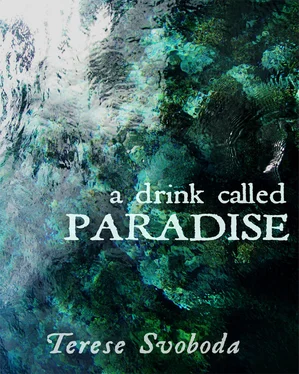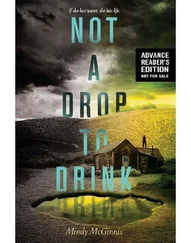Hey, says Harry, my clothes are gone.
His suspenders still dangle, but the rest of the bush is bare.
Harry looks all around his shack, but there’s nothing else. All I have left are the legs from the cutoffs, he says.
I’m more woebegone. Harry, I say. You know what just happened?
All my clothes were stolen, he says.
These kids aren’t coming back, I say. They’re gone, they’re out of here, they’ve escaped.
We stare at the reef, its foam sealing their exit. Where are the right stars? that boy asked me a couple of times, says Harry. I didn’t know.
How long do you think it took them to make that boat? I ask. How long would it take? I ask.
A year, maybe, Harry whispers.
The dark is all that’s left then. We do what we can in all that dark and disappointment, then we dream. But what I dream is no dream: flying fish did rise over our ship, and a woman did catch one over the lifeboat I slept in, she did slice it open and offer me its still thrashing body, and I did look down at its entrails shining and sinking in the moonlight and say, Yes, please. And the raw fish tasted milky the way men do.
It is too easy: the quaking body, the salty air. I am uneasy. I thrash and wake up with tears on my face. I don’t wake Harry when I have enough light to go. Instead I look for my thongs.
I’m at Barclay’s doorstep when I find them. Thongs have a life of their own here, someone is always taking them, so they show up before you do. Is this someone reporting my night out with Harry? I am still working my feet into the thongs when the first long wail catches me. It’s not a pig this time, this time it is a woman. A woman wails. There’s no other sound like it, it’s female. And there, at the flowered door pulled back, stands Ngarima, wailing. For what? My one night’s absence? Nothing I could do could produce that sound from someone. That sound frightens me. I don’t move, I don’t move or go forward.
Breasts for Three stands beside Ngarima now, and she wails as well. She is holding the moldy comic book that Ngarima’s son kept hidden in a basket in the cookhouse and a broken thong that he’d repaired with tape. Then another woman crowds the doorway behind them. Her wail joins theirs, their three bodies go taut with the grief of wailing.
I stand there. It’s not about me.
Barclay comes around the back of the house. He is rigid, walking forward, holding Temu by the neck, pushing Temu and his windmilling arms around me and the women and into the house without a word to any of us. Barclay is crying.
I sit in the shade in front of Barclay’s place. All day people bring candy wrappers, bits of twine, a tiny toy, a stone, whatever Ngarima’s son touched or liked, a sprouted coconut with Styrofoam insides that Ngarima eats on the porch, salts with her tears. Once a woman comes who wails louder than Ngarima, carrying a yowling cat. She is the mother of one of the other boys I saw with Ngarima’s son, and it is his cat she carries, that claws at her arm. The mother of the third boy arrives, bringing only a pair of the boy’s shorts.
Boys do this, Breasts for Three tells me when she has no breath left. Boys get restless, they build a boat, and then they must use it. How to stop them? Then they get lost. They don’t know how to go — we don’t know anymore ourselves. Sometimes later someone will see them in Singapore or Cairns, but they will not be boys then, they will be the ghosts of boys having gone so far in these boats. But never mind — most boys die.
At sea? I don’t say.
I also don’t say I saw him, I could have stopped him. I say, Maybe they are only trying the boat out.
Breasts for Three says they chose to launch the boat at Harry’s because there no one would see them. We see nothing, she says. I have to agree, I have to nod and look away. She says everyone else knew what the boys were doing, but no one can keep a boy even if he has no money for a fare. Boys like leaving. No one else wants to leave, this is our home — paradise. Only if someone needs medicine do they leave.
It is dark when I decide to slip inside and gather whatever of my things Temu hasn’t gutted or strewn, and I shove all of it under my bag of rice. Barclay holds the boy’s arms back by the elbows when I lift my curtain to go back out. Barclay holds him, but Temu struggles to free himself. He wants to what? Take his grief out on me? Does he have grief? Or does he want to beat me for just being there?
I will go sleep on the beach. Sleeping on the beach is what you’re supposed to do on a perfect island like this anyway, I don’t know why I haven’t done it sooner. Temu certainly wanted me out, even if he does sleep elsewhere, even if Ngarima says I must sleep in his room. Anyway, if the beach is hot, so are the beds. I shake the hands of each of the chief mourners slumped in wailing stupor on the porch, and I touch many of the hands of all the others who have come, who weep too, even the men, whose weeping frightens me, who wail men-wails and beat on the coral and each other, then I go to pick out a stretch of beach that will do for the night, and damn the roving rapists, the dying half lives.
Mosquitoes graze in every depression, they come out of the bush as another sharp, cutting part of the bush, a part that flies. Where two palms grow close, where the wind presses these palms flat the way it is always blowing, where the wind picks up sand in sheets and stings so no mosquito stays, a place not far from where the car parts rust in their coral colors, not far from where a boat might come if it came, I hollow out a place anyway and line it with my flowered cloth. I don’t dig too deep, not to China, not to whatever’s left of a jelly baby. Then I lie down to test my hollow for later, pull palm fronds and scrap leaves over me, and I fall asleep, my sleep with Harry having been slight.
Real night is about to fall when I wake. Loud singing wakes me, from people who don’t see me, filing past, singing with all the lust taken out, with no fists thrust up into the sky, no hips swinging and rolling. They file past my place, and they carry things — the comic book, the thong, the toys — and two men, Barclay one of them, and one woman walk out past the wharf into the lagoon with these things that they weight with stones and make into parcels, that they drop in.
The boys are gone, they are buried.
Returning, Barclay passes me, Ngarima passes. I’m now standing beside a line of moving people, trying to look as if I know what it is that they feel. There’s nothing you can day is what I would say to excuse myself, but that wouldn’t be nothing enough.
I move to the wharf after they’ve all gone. I expect to see the bright newsprint of the boy’s comic book floating back in minutes, the way my bottle did, but nothing shows. A few things do get away. Then a star falls out of the sky, and I know as I watch the bright night with all the strange constellations built into its darkness that even the sky gets away.
My son got away.
He is dead. Dead for a year — a year, is it? Dead for however long it takes to work that hard after. An accident is that hard. An accident is nobody’s fault, you’re on your own, there’s just a doctor to sign papers, your ex to tell you how stupid you were to let it happen. That’s why there’s no telling anyone, there’s no mourning — I am that stupid.
He is not dead. See the stars, see the rain that fell, the ocean?
I get back down into my pit, and I weep at last.
Morning.
Why not walk to where the middle of the island might be, where fewer people walk and where I can’t see the ocean over either shoulder?
Why not not walk? I stop anywhere, I look into the bush that has bitten me — or is that mosquitoes? I look into it, but there’s no picture made in my head of bush or bugs.
Читать дальше












